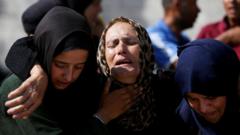As Israel weighs the next steps in the ongoing conflict with Hamas, recent developments hint at possible progress towards a cease-fire that could reshape the future of Gaza.
Israeli Ministers Convene to Discuss Possible Truce with Hamas

Israeli Ministers Convene to Discuss Possible Truce with Hamas
The Israeli government prepares to evaluate truce negotiations as Hamas responds positively to a cease-fire proposal.
Israeli government ministers are poised for a critical meeting to discuss the latest American-backed initiative aimed at achieving a cease-fire in Gaza amidst a backdrop of continued violence. On Friday, Hamas signaled a readiness to engage in negotiations regarding a recent truce proposal, claiming that its response was “characterized as being positive.”
This proposed cease-fire framework outlines a potential 60-day truce during which hostages could be exchanged for Palestinian prisoners, alongside a withdrawal of Israeli troops to designated lines. Mediators, potentially from Egypt or Qatar, would be integral in facilitating communications, as direct contact between the two parties remains unlikely.
While there appears to be a mutual willingness to explore this truce, significant hurdles remain. Both sides will need to navigate sensitive issues that have previously been points of contention. Hamas is advocating for assurances that any temporary cease-fire will not detrimentally impact its quest for a sustainable resolution to the conflict, whereas Israeli Prime Minister Benjamin Netanyahu has taken a firm stance on not halting military operations until Hamas is fully dismantled in Gaza.
The discussions set for Saturday evening might shape the conflict’s trajectory in the immediate future, drawing attention to the delicate balance between humanitarian concerns and political objectives intrinsic to the ongoing conflict.
Negotiations are critical because weeks of escalating violence have led to catastrophic humanitarian conditions in Gaza, with reports of extensive casualties and destruction. The international community's role, particularly that of the United States, in brokering peace is paramount as both parties prepare to enter this complex dialogue, which holds profound implications for regional stability.
This proposed cease-fire framework outlines a potential 60-day truce during which hostages could be exchanged for Palestinian prisoners, alongside a withdrawal of Israeli troops to designated lines. Mediators, potentially from Egypt or Qatar, would be integral in facilitating communications, as direct contact between the two parties remains unlikely.
While there appears to be a mutual willingness to explore this truce, significant hurdles remain. Both sides will need to navigate sensitive issues that have previously been points of contention. Hamas is advocating for assurances that any temporary cease-fire will not detrimentally impact its quest for a sustainable resolution to the conflict, whereas Israeli Prime Minister Benjamin Netanyahu has taken a firm stance on not halting military operations until Hamas is fully dismantled in Gaza.
The discussions set for Saturday evening might shape the conflict’s trajectory in the immediate future, drawing attention to the delicate balance between humanitarian concerns and political objectives intrinsic to the ongoing conflict.
Negotiations are critical because weeks of escalating violence have led to catastrophic humanitarian conditions in Gaza, with reports of extensive casualties and destruction. The international community's role, particularly that of the United States, in brokering peace is paramount as both parties prepare to enter this complex dialogue, which holds profound implications for regional stability.



















